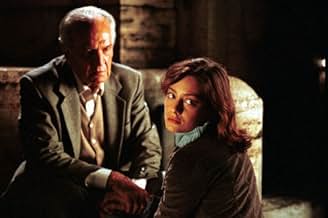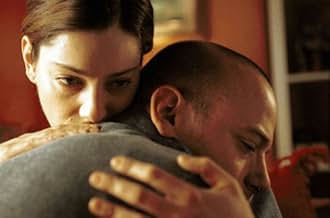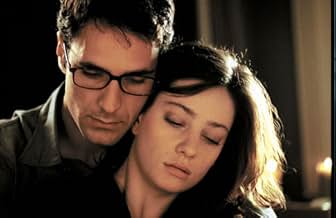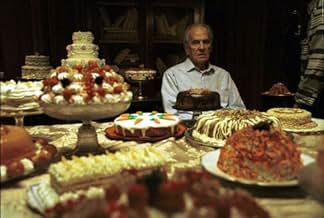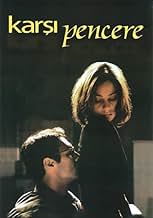IMDb RATING
7.2/10
12K
YOUR RATING

Play clip2:59
Watch Facing Windows Scene: I Don't Taste Things As Good As I Once Did
Overburdened and stuck in a greying marriage, Giovanna takes to caring for the Jewish Holocaust survivor her husband brings home. As she begins to reflect on her life, she turns to the man w... Read allOverburdened and stuck in a greying marriage, Giovanna takes to caring for the Jewish Holocaust survivor her husband brings home. As she begins to reflect on her life, she turns to the man who lives across from her ...Overburdened and stuck in a greying marriage, Giovanna takes to caring for the Jewish Holocaust survivor her husband brings home. As she begins to reflect on her life, she turns to the man who lives across from her ...
- Director
- Writers
- Stars
- Awards
- 34 wins & 24 nominations total
Antonella Antinori
- Tintora
- (as Veronica Bruni)
Ohame-Brancy Chibuzo
- Alessio
- (as Ohame Brancy Chibuzo)
- Director
- Writers
- All cast & crew
- Production, box office & more at IMDbPro
Featured reviews
"Facing Windows (La Finestra di fronte)" is like a very European and more sophisticated take on "The Notebook," as it shifts between romantic and culinary past and present through the in-and-out consciousness of an elderly man.
The "Rear Window" eroticism is just one element that accidentally brings together tangled, stymied lives swirling around lovely, exhausted, frustrated chef, wife and mother Giovanna Mezzogiorno, where each child, man, woman, friend and neighbor has separate priorities and fantasies that annoying real life interferes with, from the practical to the political.
Each character and their ties are both delightfully and surprisingly complex and the actors are so comfortable bringing each to complete life that you think you too should be able to come out of the theater speaking Italian so naturally.
But this is a frank, gritty, contemporary, urban Italy we don't usually get to see, with multi-racial immigrants, underemployment and a Fascist past.
The sentimentalism of the live with no regrets lesson is leavened by the seriousness of the final revelations and the compromises that each character still makes.
The music selections nicely fit each character.
The "Rear Window" eroticism is just one element that accidentally brings together tangled, stymied lives swirling around lovely, exhausted, frustrated chef, wife and mother Giovanna Mezzogiorno, where each child, man, woman, friend and neighbor has separate priorities and fantasies that annoying real life interferes with, from the practical to the political.
Each character and their ties are both delightfully and surprisingly complex and the actors are so comfortable bringing each to complete life that you think you too should be able to come out of the theater speaking Italian so naturally.
But this is a frank, gritty, contemporary, urban Italy we don't usually get to see, with multi-racial immigrants, underemployment and a Fascist past.
The sentimentalism of the live with no regrets lesson is leavened by the seriousness of the final revelations and the compromises that each character still makes.
The music selections nicely fit each character.
What a rich and satisfying film this is! The complexity of lives interweaving, with a transformative impact is a rare experience in this medium.
Life is full of chance meetings...often ignored...but in this film it is pivotal. A young couple, having serious relational problems, come upon a dazed old man on the street. His entrance in their lives, his own dramatic life and the wife's (Giovanna's) ultimate connection to him serves as a link to her profound choices...First, to risk a sexual encounter with the handsome neighbor she's watched through her facing windows and second, to recognize that her discontent has been with herself, more than her loving husband. The complexity of the old man's life...his survival of a concentration camp...giving up a beloved lover to save others...his success as a famous pastry chef...all contribute in a tangential way to Giovanna's transformation. The final scene is enormously moving and meaningful.
Don't miss this gem...if humanism, great performances and cinematic richness are important to you.
Life is full of chance meetings...often ignored...but in this film it is pivotal. A young couple, having serious relational problems, come upon a dazed old man on the street. His entrance in their lives, his own dramatic life and the wife's (Giovanna's) ultimate connection to him serves as a link to her profound choices...First, to risk a sexual encounter with the handsome neighbor she's watched through her facing windows and second, to recognize that her discontent has been with herself, more than her loving husband. The complexity of the old man's life...his survival of a concentration camp...giving up a beloved lover to save others...his success as a famous pastry chef...all contribute in a tangential way to Giovanna's transformation. The final scene is enormously moving and meaningful.
Don't miss this gem...if humanism, great performances and cinematic richness are important to you.
One of the greatest Turkish directors ever, Ferzan Ozpetek has long proved himself as a director who doesn't only make good films but also makes them his own. With the elegant cast, the wonderful soundtrack and a cleverly knit story, La Finestra di Fronte is no exception to his brilliant movie-making.
Beginning with the suffocatingly ordinary life of a young couple in Rome and developing as the couple host a stranger, an old man in their house and the lead actress' "improper" attraction to a stranger about whom she knows nothing; the story unfolds into the impossibility of two parallel love stories. The story of two young men during the Nazi suppression; and that of a man and a married woman; two relations both of which are considered highly immoral in their respective environments.
Through the flashbacks, we are taken back to how love finds a way in a country under occupation and we see how the young woman sees her own love's fate in the old man's sad story.
Worth seeing, and seeing again.
Beginning with the suffocatingly ordinary life of a young couple in Rome and developing as the couple host a stranger, an old man in their house and the lead actress' "improper" attraction to a stranger about whom she knows nothing; the story unfolds into the impossibility of two parallel love stories. The story of two young men during the Nazi suppression; and that of a man and a married woman; two relations both of which are considered highly immoral in their respective environments.
Through the flashbacks, we are taken back to how love finds a way in a country under occupation and we see how the young woman sees her own love's fate in the old man's sad story.
Worth seeing, and seeing again.
"Facing Windows" 2003 is a very thoughtful, gentle Italian film telling us how frustrating human conditions of the heart can be transformed by one another.
Giovanna Mezzogiorno (also in "Don't Tell" aka Beast of the Heart) plays Giovanna the central 'heroine' - a young woman with plenty of mixed emotions, who is discontented with her (chicken factory accountant) job, mother to two children, wife to a husband who's night shift job schedule frustrates her, and most of time she shouts at him and wouldn't want to listen - yes, she's quite bitchy about herself, though finds brief solace when doing bit of occasional baking. Through the course of meeting the unexpected stranger that Massimo Girotti portrayed - Simone/Davide the old man at a lost, who seems to have amnesiac problem and was temporarily taken in by Giovanna's husband into their home against her wishes, yet her whole world starts to change. Writer-director Ferzan Ozpetek has a way of telling his stories, always full of humanity, foibles and virtues mixed together, turning out a thoughtful film never short of gentleness and the sharing of human kindness.
There are side events, of course: the young man whom she now and then noticed across her kitchen window in the next building, the flashbacks and 'Déjà Vu' storyline that the old man Simone experiences, the delightful turn of events - those attractive delicious-looking display of cakes and cakes - what a baker's dream!
Filmmaker Ozpetek, who was born in Turkey and lived in Italy, includes poetry in his films: he introduced Turkish poet Nâz1m Hikmet through his characters in "His Secret Life." Here, we get to hear Giovanna thinking aloud, talking to Davide: " I feel your gestures in mine, and I recognize you when you speak. Does everyone who leaves you - always leave part of themselves with you? Is this the secret of having memories?"
The cast is just wonderful, of course, Mezzogiorno and Girotti were fascinating to watch. The music by Andrea Guerra complemented the cinematography by Gianfilippo Corticelli. If you'd like more of Ozpetek's work, try "Hamam: A Turkish Bath" 1998 (my first IMDb review posted on 10 January 1999) and "His Secret Life" aka The Ignorant Fairies, 2001.
Giovanna Mezzogiorno (also in "Don't Tell" aka Beast of the Heart) plays Giovanna the central 'heroine' - a young woman with plenty of mixed emotions, who is discontented with her (chicken factory accountant) job, mother to two children, wife to a husband who's night shift job schedule frustrates her, and most of time she shouts at him and wouldn't want to listen - yes, she's quite bitchy about herself, though finds brief solace when doing bit of occasional baking. Through the course of meeting the unexpected stranger that Massimo Girotti portrayed - Simone/Davide the old man at a lost, who seems to have amnesiac problem and was temporarily taken in by Giovanna's husband into their home against her wishes, yet her whole world starts to change. Writer-director Ferzan Ozpetek has a way of telling his stories, always full of humanity, foibles and virtues mixed together, turning out a thoughtful film never short of gentleness and the sharing of human kindness.
There are side events, of course: the young man whom she now and then noticed across her kitchen window in the next building, the flashbacks and 'Déjà Vu' storyline that the old man Simone experiences, the delightful turn of events - those attractive delicious-looking display of cakes and cakes - what a baker's dream!
Filmmaker Ozpetek, who was born in Turkey and lived in Italy, includes poetry in his films: he introduced Turkish poet Nâz1m Hikmet through his characters in "His Secret Life." Here, we get to hear Giovanna thinking aloud, talking to Davide: " I feel your gestures in mine, and I recognize you when you speak. Does everyone who leaves you - always leave part of themselves with you? Is this the secret of having memories?"
The cast is just wonderful, of course, Mezzogiorno and Girotti were fascinating to watch. The music by Andrea Guerra complemented the cinematography by Gianfilippo Corticelli. If you'd like more of Ozpetek's work, try "Hamam: A Turkish Bath" 1998 (my first IMDb review posted on 10 January 1999) and "His Secret Life" aka The Ignorant Fairies, 2001.
Having seen all of Ferzan Ozpetek's films, I looked forward seeing this new picture, which just started a commercial run locally. Without a doubt, this is even more complex than the ones before. Mr. Ozpetek is a director that shows great talent. He has worked in the screen play as well.
This is a film that presents two stories that are completely different from one another. The beginning of the movie takes us back to 1943 Rome, at the height of the war. We witness what happens in the opening sequence without any knowledge of how will it play in the total outcome of the picture.
The film then changes to present day Rome. We see Giovanna and Filippo, who are struggling to make ends meet. They meet one day a mysterious old man who is trying to give them money. They end up bringing him home since the local police can't do anything. This man, Simone, has the clue to the puzzle of the first part of the film, but that will come at the end.
Giovanna's marriage to Filippo is in danger of failure. Giovanna suddenly discovers a life in the apartment across the street. Lorenzo, who lives alone, turns out has been spying on Giovanna as well. They get to meet, but common sense prevails and their possible relationship never amounts to anything.
Giovanna Mezzogiorno is one of Italy's leading actresses. Not only is she attractive, but she can act, as well. Miss Mezzogiorno has one of the most expressive and beautiful eyes we have seen in a long time. Not only that, but she expresses so much by looking directly into the camera.
Massimo Girotti, another great figure in the Italian movies is the mysterious Simone, who in reality is Davide, a master dessert chef who owned one of Rome's most prestigious pastry shop. Mr. Girotti's magnificent presence in the film makes the most with his pivotal role.
The film is deeply satisfying. Another great film by Ferzan Ozpetek.
This is a film that presents two stories that are completely different from one another. The beginning of the movie takes us back to 1943 Rome, at the height of the war. We witness what happens in the opening sequence without any knowledge of how will it play in the total outcome of the picture.
The film then changes to present day Rome. We see Giovanna and Filippo, who are struggling to make ends meet. They meet one day a mysterious old man who is trying to give them money. They end up bringing him home since the local police can't do anything. This man, Simone, has the clue to the puzzle of the first part of the film, but that will come at the end.
Giovanna's marriage to Filippo is in danger of failure. Giovanna suddenly discovers a life in the apartment across the street. Lorenzo, who lives alone, turns out has been spying on Giovanna as well. They get to meet, but common sense prevails and their possible relationship never amounts to anything.
Giovanna Mezzogiorno is one of Italy's leading actresses. Not only is she attractive, but she can act, as well. Miss Mezzogiorno has one of the most expressive and beautiful eyes we have seen in a long time. Not only that, but she expresses so much by looking directly into the camera.
Massimo Girotti, another great figure in the Italian movies is the mysterious Simone, who in reality is Davide, a master dessert chef who owned one of Rome's most prestigious pastry shop. Mr. Girotti's magnificent presence in the film makes the most with his pivotal role.
The film is deeply satisfying. Another great film by Ferzan Ozpetek.
Did you know
- TriviaMassimo Girotti died on 6 January 2003 and the movie is dedicated to his memory. Before he was cast, Ferzan Özpetek had considered also Jean Rochefort and Serge Reggiani for his role.
- SoundtracksLa Finestra di fronte
Written by Andrea Guerra
- How long is Facing Windows?Powered by Alexa
Details
- Release date
- Countries of origin
- Official sites
- Language
- Also known as
- Facing Windows
- Filming locations
- Ponte Sisto, Rome, Lazio, Italy(where Giovanna and Filippo meet Simone)
- Production companies
- See more company credits at IMDbPro
Box office
- Gross US & Canada
- $543,354
- Opening weekend US & Canada
- $36,061
- Jun 20, 2004
- Gross worldwide
- $15,535,312
- Runtime
- 1h 46m(106 min)
- Color
- Sound mix
- Aspect ratio
- 2.35 : 1
Contribute to this page
Suggest an edit or add missing content





